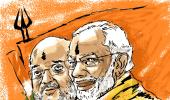The prime minister and his Cabinet will be compelled to do what governments in other democracies must: Listen to criticism from citizens and tolerate it and even learn from it.
In doing so, perhaps they can also get a laugh out of the material, as many of us so often do, notes Aakar Patel.

The dictionary defines the word 'propaganda' as being 'information, especially of a biased or misleading nature, used to promote a political cause or point of view.'
In Old India, propaganda was managed by controlling Doordarshan. Or at least that is what political parties assumed.
The news segments in the evenings reported on the government and its agenda.
The Opposition was given no space. This was accepted as being natural.
During elections, however, the Opposition would demand to be given as much screen time as the ruling party, especially in delivering their manifestos.
Party leaders would read them out in front of the camera, and smaller parties would then ask to be given as much time as the larger ones.
With the coming of private news channels a quarter century ago, this changed and instead of Doordarshan, or perhaps along with it at least in the initial years, senior party leaders would come to panels in studios.
It seemed that this was the dawn of independence and some of the senior journalists around today are the product of that time, particularly those who were in the old Star News segment which became NDTV.
The phenomenon of Godi media beginning in the months before 2014 took us back considerably to propaganda.
This time it was worse than in Old India and more damaging.
On Doordarshan, the Opposition was merely ignored; it was not daily vilified and attacked and called anti-national.
On Doordarshan, even when it was in the hands of hypocrites, minorities were not the constant target and distraction was not the only game.
In New India this became the daily fare of the channels and remained so for a decade.
But a third shift has now come and while it is relatively recent it is so fully established that the government is moving to gain control over it.
That shift is the rise of independent journalists using social media to reach large audiences.
This includes the set of people known as content creators, who might not necessarily be journalists by background but engage with current affairs through humour, particularly satire.
How large are their audiences?
Have a look at the numbers. On YouTube, independent journalists have as much reach as news channels.
Punya Prasun Bajpai (47 lakh subscribers), Ajit Anjum (61 lakh), Abhisar Sharma (67 lakh) and Ravish Kumar (1.1 crore) can rival entire news networks.
Times Now (53 lakh subscribers), Republic (62 lakh) and India Today (93 lakh) are in the same region.
Dhruv Rathee (2.3 crore subscribers) has as much reach as Zee News (3.6 crore).
Indeed in many ways the reach of the independent voices is more because of the concentration of their content on one specific daily issue.
The average Ravish Kumar video gets over 10 lakh views while the average one from Zee gets a few thousand, because there are so many of them.
Distribution of these clips through WhatsApp further amplifies the independent voice's reach.
The sharing of advertising revenue by social media networks like YouTube afford these individuals the opportunity to be able to do their work outside of a corporate space.
In addition to the journalists, a set of humourists has risen to comment on our times.
They are the product of the stranglehold of Godi media and the suffocation people have felt of having propaganda inflicted on them.
A few names are worthy of mention, like Bhagat Ram, Ms Medusa, Meghnad, Garima, Ranting Gola, Shyam Rangeela and Urvish Kothari, all of whom I follow and greatly admire and whose work I enjoy.
Unfortunately for the government there are few quality creators on the other side.
This is because propaganda and sycophancy are not good ingredients for humour.
Godi creators tend to produce content that is sullen and angry and for this reason generally ignored.
It will take an academic paper or a book to examine the effect of the independent voices on our democracy.
There is to my mind little doubt that they have managed to loosen the monopoly of the Modi government on narrative.
It is for this reason that the government has moved to throttle the voices of the creators and independent journalists.
This is being done through the broadcast bill a draft of which is being circulated (this column was written before the bill was withdrawn).
Essentially it seeks to regulate everyone who is on social media because that is the only way in which the government can interfere, block and ban content it doesn't want seen.
The government is also trying to go after independent Web sites like Wire, Scroll, Newslaundry and Newsminute.
Because these creators are independent individuals on social media, they cannot be licensed or regulated in the way that news channels can.
This is why the government is attempting to do this with the broadest of definitions that will affect every single person using social media.
The intent might be to use the law in targeted fashion but that will not be how it will turn out. Bad laws produce bad outcomes.
Will the Modi government be successful in pushing the regulation through? It will not. This is not the same place we were last year.
There are too many obstacles for it and too many points of resistance.
Even if it had been passed in the previous parliament through brute force it would have been a total mess in implementation.
The prime minister and his Cabinet will be compelled to do what governments in other democracies must: Listen to criticism from citizens and tolerate it and even learn from it.
In doing so, perhaps they can also get a laugh out of the material, as many of us so often do.
Aakar Patel is a columnist and writer and you can read Aakar's earlier columns here.
Feature Presentation: Aslam Hunani/Rediff.com










